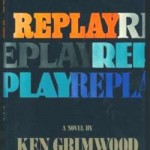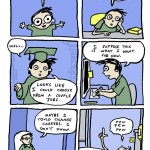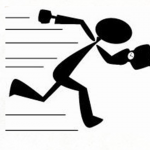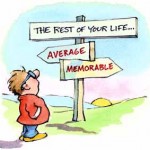Decide What’s Truly Important to You
During a discussion about capital punishment, a banker suggests that the death penalty is preferable to imprisonment for life. The banker argues that “Capital punishment kills a man at once, but lifelong imprisonment kills him slowly.”
In response to this, a lawyer explains that if he were given a choice between the two, he would certainly choose imprisonment for life. The lawyer’s reasoning is that “To live anyhow is better than not at all.”
Upon hearing the lawyer’s retort, the banker shouts: “It’s not true! I’ll bet you two million you wouldn’t stay in solitary confinement for five years.” Upping the ante, the lawyer states “I’ll take the bet, but I would stay not five but fifteen years.”
The banker agrees, and the outrageous bet is carried out as follows:
- The lawyer would spend the years of his captivity under the strictest supervision in one of the lodges in the banker’s garden.
- For 15 years he could not cross the threshold of the lodge, see human beings, hear the human voice, or receive letters and newspapers.
- He was allowed a musical instrument and books.
- He was allowed to write letters, to drink wine, and to smoke.
- The only “interaction” with the world would be done using a small window made solely for that purpose. He could have anything he wanted – books, music, wine, and so on – in any quantity he desired by writing an order, but could only receive them through the window.
The rules of the agreement continued in this manner to cover every detail which would ensure that his imprisonment would remain strictly solitary.
It was stated that the lawyer was bound to stay there exactly fifteen years, and any attempt to break these conditions, even if only two minutes before the end, released the banker from the obligation to pay him the two million. [Adapted from the full text, available here.]
“The Bet” has been my favorite short story since I read it nearly ten years ago. I’m certain that the reason I enjoy it so much is because of the unique opportunity the lawyer is given: Fifteen years of “free time” without worry of starvation.
In some ways, I envy the lawyer. At the cost of social interaction, he is granted a remarkably simple lifestyle. He doesn’t need to work — his only “job” is to stay within the confines of his lodging. He doesn’t need to earn money to sustain himself — his jailer provides him with food, drink, and shelter. In essence, every fundamental aspect of the lawyer’s life is covered by the arrangement, leaving only an abundance of time.
Whenever I read this story, I imagine what I would do if I were in the lawyer’s position. Like him, I would choose a piano to be my musical instrument companion. Also like him, I would spend most of my time reading and writing. Of course, the rules of the agreement don’t allow for much else.
In any event, the arrangements of the bet strip the complex layers of human existence away — reducing it to nothing more than a finite amount of time. This gross simplification of life was permanently burned into my brain.
Consequently, I regularly question the value of my existence. When I find myself working a job I don’t enjoy, I constantly ask myself “What am I doing?” — “For who?” — and most importantly, “Why?”
The answers to those questions — I don’t know, I don’t know, and I don’t know — were a clear indication that I was doing something wrong. After all, if I only have so much time to live, why was I investing such a substantial part of my life in matters I had no passion for?
Probably because that’s what is considered “normal” in American culture. Nearly everyone I’ve ever known has chosen a relatively ordinary life, where they define their life’s purpose through their job. They intend to work for the majority of their life — often doing something unspectacular — just to accumulate belongings, retire late in life, and then die. To those that have chosen such a path, I ask: Shouldn’t there be more to life than just a routine (and often mundane) lifestyle?
I think my girlfriend Cassie put it best when she said “I don’t want to be famous or anything crazy. I just want to sing and not starve.”
That’s how she wants to spend her finite amount of time in this life, because that’s what’s truly important to her.
As for me, I suppose I just want to write and not starve, because that’s what’s truly important to me.
Now how about you?
Related Posts
| If you've found this website helpful, please click the PayPal button. You will be helping me pursue my dream career as a writer. Thanks for your support! |














8 Responses to “Decide What’s Truly Important to You”
This is the reason some people start their own company. It is a lot of stress but it teaches you a lot and is never boring (especially if there are many competitors in the field).
That’s a great story!
There are really quite a lot of things I wish to do. And if I could make money out of them, I guess it would be great.
The most important thing that I want to do is.. to design!
I like that quote of Cassie’s because it fills me with hope. My life goal is to be an Oracle.
I, too, would take that bet and do it for fifteen years. Especially if I had run into that banker about 5 years ago! Hah. Who’s zoomin’ who?
I just found this website today and I must say I like your writing: both it’s content and it’s style.
You bring up good points, in this post and in others.
I just want to play with stocks all day and not starve.
you this man, may God continue to give you thoughts that will bring solution to peoples life.
my broda i love u, keep it up
I just want to make warcraft 3 maps and not starve, but, the way the world is, that’s not possible.
The equation gets a bit more complicated when you throw your kids in.